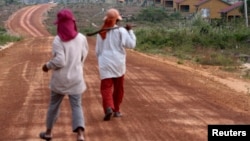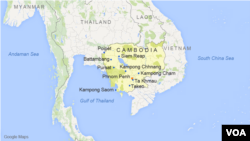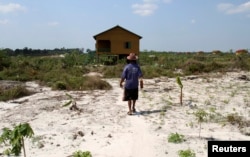A land dispute in Cambodia involving a multibillion-dollar Chinese development is again under scrutiny after 200 families displaced by construction returned to their homes, demanding the company give them more compensation.
In 2012, the families agreed to relocate from their homes in Koh Kong province in exchange for payments and a new home elsewhere provided by the company, Union Development Group (UDG).
They relocated more than three years ago, but since then have complained of poor living conditions and indebtedness at the relocation sites and decided to move back to their vacated homes to pressure the company.
On Thursday, the company agreed to discuss additional compensation, but did not provide specifics.
In May, 22 families received compensation from the company after negotiating higher payments than those who moved in 2012.
Um Virak, a representative of the families from Kiri Sakor district’s Koh Sdech commune, said the 2012 claimants had been given a bad deal and struggled to earn a living in the place where they had been relocated.
Many ended up in debt to loan sharks and selling the land they received in compensation in order to pay off the debts.
Want new deal
Studies of the new relocation sites have shown that average household incomes have fallen since the families moved.
“As you already know, in the new location, the people faced a lot of difficulties, so some people sold most of their land, meaning they couldn't almost find houses to live in now due their impoverished standard of living,” he said. “We just want to get equal money and land. Then [we] will stop.”
UDG, which was granted a 45,000-hectare concession by the government in 2008, said it would invest $3.8 billion into a multipurpose tourism development in the heart of the Botum Sokor National Park.
More than 1,000 people have already been relocated, while small numbers of holdouts remain on the UDG concession.
In Kongchet, provincial coordinator for local rights group Licadho, said: “They returned to their old residence and demanded the Chinese firm and inter-ministerial committee provide cash compensation for their land, house and farm products.”
He added that families granted compensation in May had received more than their counterparts only after protesting for many years and enduring harassment and intimidation from company security guards.
No formal complaints
Bun Leut, a Koh Kong provincial governor, told VOA Khmer on Tuesday that they had not received any formal complaints from the aggrieved villagers.
“First, we must wait and see what action the company will take,” he said. “The firm also needs to contact the authorities.”
Once completed, the UDG resort will include a private airport, shopping center, port and a large golf course.
A UDG representative could not be reached for comment.
VOA's Khmer Service contributed to this report.






